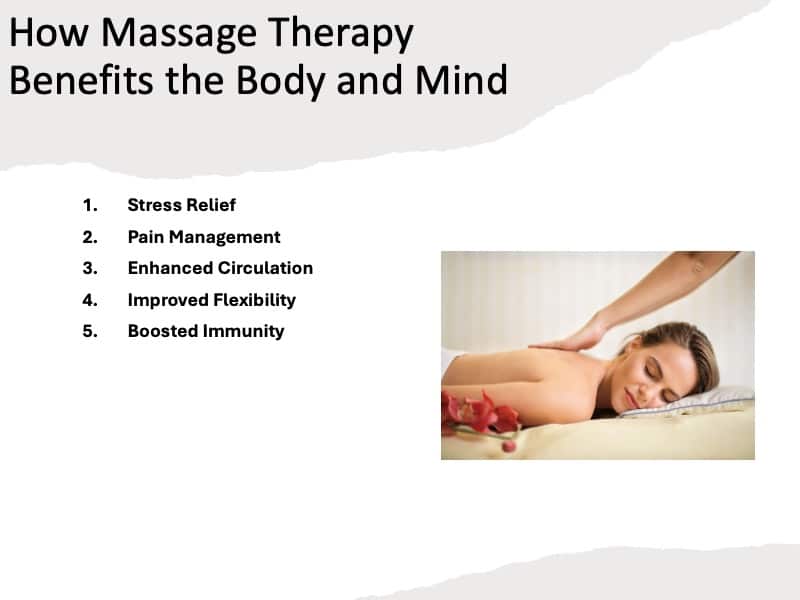Top 5 Benefits of Massage Therapy for Your Body and Mind
Massage therapy is more than a luxury; it’s a proven method to enhance physical and mental health.
The benefits of massage extend far beyond relaxation, offering therapeutic advantages such as improved circulation, stress reduction, and enhanced flexibility.
Through centuries of refinement, this practice has evolved into a versatile treatment that addresses various needs, from relaxation to targeted pain relief.
What is Massage Therapy?
Massage therapy involves the manipulation of soft tissues such as muscles, tendons, and ligaments to relieve stress, reduce tension, and promote healing.
Originating from ancient cultures, this practice has adapted over time, incorporating a variety of techniques to suit diverse needs.
Therapists use hands, fingers, elbows, or even feet to apply pressure tailored to the individual’s goals, whether relaxation, rehabilitation, or performance enhancement.
By boosting circulation, reducing muscle stiffness, and fostering mental clarity, massage therapy delivers a holistic wellness experience.
Popular Massage Therapy Styles and Techniques
Massage therapy’s versatility stems from its wide range of techniques, each tailored to specific needs. Here are some of the most popular types of massage:
- Swedish Massage: This gentle approach features long, flowing strokes combined with kneading and circular motions. Ideal for relaxation and improving circulation, it’s the most common massage type.
- Deep Tissue Massage: Designed to address chronic pain and muscle tension, this technique uses slower, deeper pressure to reach the inner layers of muscle and connective tissue.
- Sports Massage: Tailored for athletes, it targets key muscle groups, focusing on injury prevention, recovery, and enhanced performance.
- Prenatal Massage: Created for expectant mothers, this gentle massage alleviates pregnancy-related discomforts, including back pain and swollen joints.
- Trigger Point Therapy: By targeting specific muscle knots, this technique relieves tension and reduces pain associated with overuse or injuries.
How Massage Therapy Benefits the Body and Mind

Massage therapy’s benefits extend beyond relaxation, influencing physical, emotional, and even immune health. Here’s how:
- Stress Relief: By lowering cortisol levels, massage reduces stress and promotes a sense of calm, improving overall mood.
- Pain Management: It provides a natural alternative for alleviating chronic pain, targeting problem areas to ease discomfort and muscle tightness.
- Enhanced Circulation: The applied pressure improves blood flow, supplying muscles with oxygen and nutrients while supporting the lymphatic system.
- Improved Flexibility: Regular sessions can increase the range of motion and reduce injury risk by loosening tight muscles and improving joint function.
- Boosted Immunity: Studies suggest that massage can stimulate white blood cell activity and reduce inflammation, enhancing the body’s defenses.
Incorporating Massage Therapy into Self-Care
Regular massage sessions can transform your self-care routine, fostering physical and mental well-being. Here’s how:
- Better Sleep: By relaxing the body and reducing stress, massage promotes deeper, more restful sleep.
- Mental Clarity: It helps refresh the mind, improving focus and reducing mental fatigue.
- Cultivates Mindfulness: Massage’s soothing nature encourages living in the present, reducing anxiety and promoting emotional balance.
Maximizing Your Massage Therapy Experience
To fully benefit from massage therapy, consider these practical tips:
- Set Clear Goals: Define whether you seek relaxation, pain relief, or enhanced mobility, so your therapist can tailor the session.
- Communicate Your Preferences: Don’t hesitate to provide feedback about pressure or focus areas during the massage.
- Hydrate Afterward: Proper hydration post-massage helps flush out toxins and supports recovery.
- Follow-Up Care: Incorporate any recommended stretches or exercises to maintain the benefits between sessions.
Choosing the Right Massage Therapist
Selecting a qualified therapist is essential to maximize massage therapy’s benefits. Here’s what to look for:
- Certification and Experience: Ensure your therapist has the necessary credentials and expertise in your desired massage style.
- Client Reviews: Online testimonials can offer insights into their professionalism and effectiveness.
- Communication Skills: A good therapist listens to your needs, adjusting pressure and techniques to suit your preferences.
- Ambiance: The environment plays a significant role; a calm, welcoming space enhances relaxation and the overall experience.
Finding Local Massage Therapy Options
For personalized experiences, local massage therapists or wellness centers can cater to your unique needs.
Whether you’re looking for general relaxation or a targeted therapeutic session, researching nearby services ensures you find the right fit.
Platforms like Yelp or Google Reviews can guide you to well-reviewed professionals in your area.
Final Thoughts: Is Massage Therapy Good for You?
Massage therapy is a powerful tool for achieving physical and mental balance. From easing chronic pain to enhancing flexibility and promoting mindfulness, its benefits are vast and varied.
Choosing the right therapist and technique is essential to unlock its full potential, making it an invaluable addition to your wellness journey.
Prioritizing regular massage sessions can lead to a healthier, more harmonious life.
Read Next: Best Self-Massage Tools



